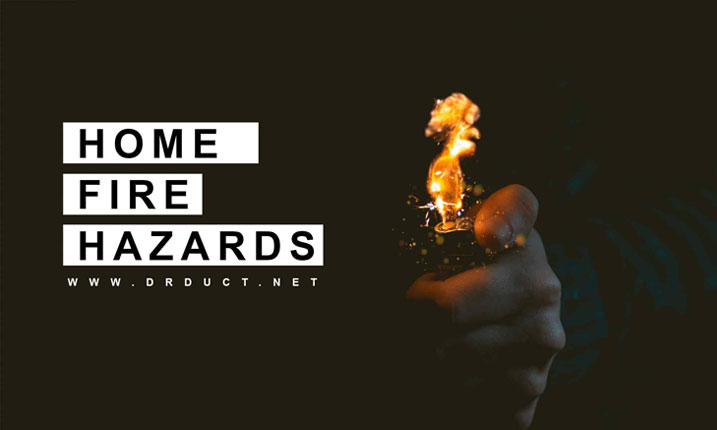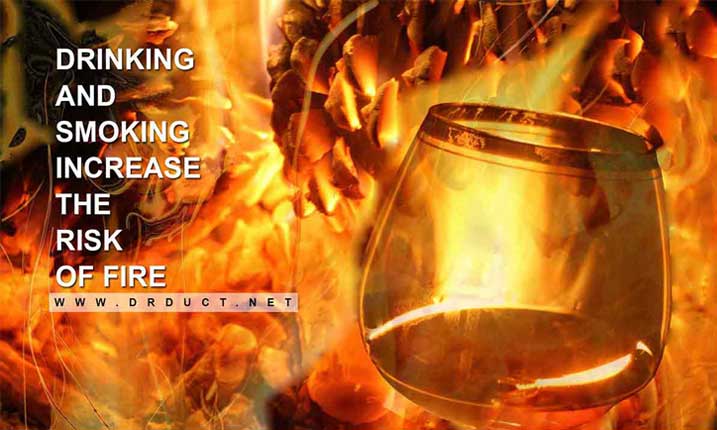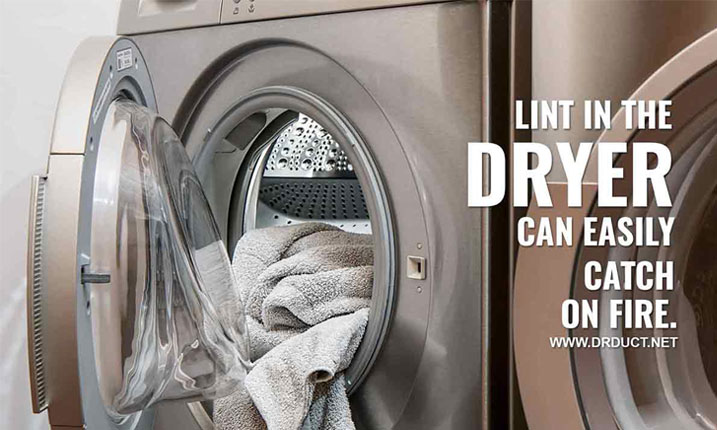
Fire is perhaps the biggest risk in the home to you and your family, and there are several fire hazards that are often overlooked. Approximately 80% of fire-related deaths happen in the victims’ own homes. Make yourself aware of some safety tips and greatly lower the risk of having a fire break out. In addition to taking preventative measures, create a clear fire escape plan to follow in the case of an emergency.
Candles

Credit:Lars Nissen
Burning candles can create a relaxing ambiance for a quiet night, or be a welcome addition to a romantic evening. Whatever the case, a candle should never be left unattended. Candles can be knocked over in a second by pets, children, or by a gust of wind. When a fire starts, it starts quickly and can get out of control in no time. So stay safe and blow out candles before you leave or go to bed. Also, keep them far from low-hanging curtains or other flammable materials.
Cooking
Many fires originate in the kitchen when someone is cooking. There are sources of intense heat in the kitchen, and highly flammable objects like cookbooks and dish towels can quickly catch a flame. The potential for an accident is amplified when you’re using several sources of heat at the same time, particularly when you’re cooking up a big meal. Disaster often strikes when a cook gets distracted and walks out of the kitchen, leaving heat and flame unattended. Remember, any fire or intense heat in the house must be supervised at all times.
Smoking Safety
There are many fire risks associated with smoking, particularly when it’s done indoors. Leaving cigarettes, pipes, or other smoking materials unattended is dangerous. Never leave a room when tobacco products are burning. Smoking in bed is another common cause of fire. When you’re in bed it’s easy to slip off to sleep while holding a lit cigarette. Avoid tragedy with these additional tips for smokers:
- Check that smoking materials are completely out before dumping an ashtray in the trash.
- Only smoke outside of the house.
- Dispose of cigarettes in ashtrays or metal canisters; don’t throw them outside where they can catch fire on dried leaves or other materials.
- When drinking alcohol, take extra care with combustible smoking materials like lighters and matches.
Matches and Lighters

Credit:Comfreak
On a related note, matches and lighters are a major hazard when left lying around the house. The biggest risk is the curiosity of children. Many young people in Ontario are injured or killed in fires every year, and lighters and matches are one of the primary causes. Statistics show 21% of child deaths in Ontario (among kids aged 0-14) were caused by playing with fire or a fire-starting object.
To prevent such heartbreak, keep all smoking materials on your person. Any other matches or lighters should be locked in a drawer or an area that children can’t access. It’s also a good idea to teach our kids that these items are dangerous and if they find one, bring it to parents or another responsible adult right away. Naturally, ensure you have working fire alarms and carbon monoxide detectors on each floor of your home.
Alcohol and Fire

Credit:Steinchen
It’s an established fact that when people drink too much they can get clumsy and careless. In any state of inebriation, it’s easy to leave a cigarette burning and walk away or start cooking and then forget what you were doing. The best idea is not to mix fire and alcohol at all. If you know you’re going to be doing a lot of drinking, avoid cooking, smoking, or burning candles. If people have been smoking in the house, do a quick check of couches and rugs around the smoking area to ensure there are no burning embers.
Electrical Fire Safety
An electrical fire can start either by accident or because of improper homeowner practices. For example, when a fuse blows, most people will simply replace the fuse or reset the breaker. It’s important to investigate why the power went out to circumvent bigger problems.
Some basic attention to the placement of everyday electrical objects (like lamps) can also help to keep you safer. Try not to place lamps anywhere near curtains or anything else that could easily catch fire. The bulb of a lamp gets extremely hot and could easily lead something flammable to ignite.
TV areas where there may be many wires on the ground require ventilation. When you’re setting up electronics, ensure you don’t have too many things plugged into one outlet. Many appliances (including refrigerators and freezers) generate heat. Heat- exuding appliances use a lot of energy, and electrical fires can spread rapidly.
Finally, it’s a great idea to get into the habit of unplugging all the smaller kitchen appliances after you’ve used them. It’s an easy habit to acquire, and can provide some peace of mind.
Dryer

Credit:Stevepb
The dryer is a huge appliance that heats up to high temperatures, and creates a lot of potential for fire. To lower the risk, clean the lint tray after every dryer use. Most machines need to be professionally cleaned every 2-3 years. Check the area around the dryer to make certain that nothing flammable has fallen behind the appliance. Finally, check your vent hose and vent line on a regular basis and make sure they are in working order. If you’re unsure about any of these steps, call an expert for assistance.
Air Duct Cleaning
Cleaning your air ducts not only makes the air safer and more breathable to all those inside a home or office, it also removes another fire risk. Regular maintenance of your ducts is crucial to the health and safety of a building’s occupants.
Home Fire Survival Guide: The Fire Extinguisher

Credit:Neupaddy
Naturally it’s important to do everything you can to prevent a fire, but what happens if one has already broken out? You need to have a plan of action for what to do before, during and after a fire.
One really essential measure to protect you in the event of a fire is to arm your home with at least one fire extinguisher. A fire extinguisher may be the one thing that prevents a small kitchen fire from becoming a raging blaze that takes down a building.
There are actually several different types of fire extinguishers, and you may want to research them carefully before you decide which one (or more) you need at home. Inspect your devices every month to make sure they’re full and haven’t expired. Large ones for big buildings need to be serviced once a year. Most importantly, know how to use them properly.
These tips will help you fireproof your home or office and keep you and your family safe from unexpected disaster. With some advance planning, you and those around you will know exactly what to do in the instance of fire. Ask your local fire department for additional tips, and remove buildup from your ducts on a regular basis.
At Dr. Duct, we are dedicated to ensuring that any flammable materials are cleaned out of your ducts, vents, and dryer. We’re here to make your house a safer place. Give us a call at (613) 845-0707 and make an appointment today.
